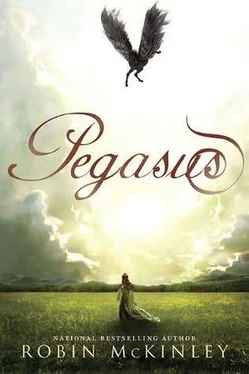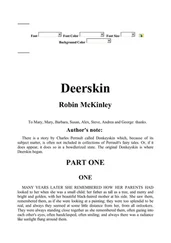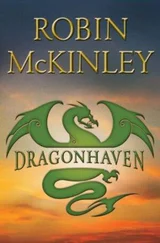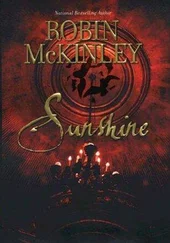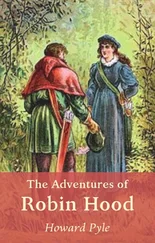Those were almost the last words she said aloud for the rest of that day. As soon as her father was gone there seemed very little reason to speak out loud; there was Ebon, of course, but more mysteriously she seemed not to want to speak aloud to the pegasi. Their own oral language was liquid and musical, but it was only “spoken” with the kinetic language which the human body could not emulate, and it seemed to her, listening and watching, that the unspoken word breaks were instead created by gesture; the sound alone was a kind of murmur, like wind or water. All those pegasi vowels, she thought. This was something else she could not imitate; she had to breathe too often, and her breaths were shallow.
Ebon had tried to tell her, when he’d helped her with her speech: Stop making those great thumping human pauses. Someone could fall into one and disappear forever. Just speak it, don’t—I don’t know, don’t marchit, like Fthoom coming down a corridor, thud thud thud.
She hadn’t known what he meant. She thought possibly she did now.
That morning Ebon was rattling the bushes at her before she had climbed out of her pond-bath. If you don’t want me to come in there after you, he said, hurry up. It’s late, and we have a long way to go.
She emerged from her little private glen still damp, crossly, rubbing her wet hair but already aware that the pegasi themselves were speaking aloud less since her father had left. This, presumably, was the usual pegasus way; they had spoken aloud more for her father’s sake, since humans were accustomed to mouth-language. Now that it was only herself, the human who could silent-speak to one of their own . . .
All alone. Her father had left her all alone —
She had washed out her clothes from the day before because she didn’t want to be dirty. She hadn’t seen a pegasus bathe, or swim, or even seen one wet, but they all gleamed, while she was almost hairless and faintly wrinkly—even the wrinkles across her knuckles, the folds in the bends of her elbows, looked ridiculous to her, surrounded by pegasi—and couldn’t gleam. But that meant she now had wet clothing to do something with—what long way did they have to go?
Here. Eat. There was a thin wooden bowl of something hot and soft that tasted a little like oatmeal with the bran still in, and another bowl of cold liquid that was almost but not quite water. Her face was the wrong shape to eat the oatmeal out of the bowl, so she dipped it up stickily and inefficiently with her fingers. It wasn’t too hot for her mouth, but it was for her fingers. She sucked them, and eyed the bushes, wondering if she could use a twig....
Oh, wet textiles, you humans, ugh, you’re obsessed with putting things in water.
She didn’t know what he did with them; he bore them off distaste-fully, tossing them round over his neck with his teeth and shuddering dramatically when they smacked down across his back, while she tried to eat without burning her fingers or getting oatmeal on her forehead. At this rate she’d need another bath.
But out on the meadow her drai was being laid out. She wouldn’t say the pegasi were hurrying, but the dance was quicker. The bowls were gently taken away from her, one at a time, by a pegasus whose name was something like Feeaha, and, putting her tentative new understanding into practise she said, “ Thank you, lady , ” trying to make it all one word, Genfwaalloofwif, and making what she hoped was a recognisable word-sign with one hand, since she didn’t have a tail and neither her nose nor her ears were mobile enough.
Feeaha looked at her what she feared was blankly for a moment—she ’d probably said something like “may all your children have seven legs”—and then answered “ Gwahayiiaya ,” which Sylvi heard as distinctly as if her father had wished her good morning. It meant, more or less, “your thanks are unnecessary but thanks for thanking me,” which did at least mean Feeaha knew what she’d tried to say. It wasn’t really peculiar that it might be easier to talk to the pegasi here, in their own country; it wasn’t that the air was clearer and sweeter and the sounds were only things like birdsong and wind. It wasn’t that there were no other humans here . . . that there were no magicians here. It was only that the pegasi were concentrating on her, and she on them.
The pegasi harnessed to her drai lifted it into the air as she sat down; as the ropes took the strain she heard the web-magic words breathed into the air, and then she was swaying gently slightly higher than she was tall when standing on her own feet. As the feather-hands tucked a blanket over her and tied the safety ropes around her, she felt something being attached to the back of the drai, but she thought it would probably be rude (and impossible) to crane round far enough to see what it was. Perhaps it was only that she was expecting it this time, but she felt much less apprehensive this morning as the pegasi surged into a gallop almost instantly, and they were airborne before she’d had a chance to remember that she still didn’t know where they were going.
Where are we going?
To the Caves, of course!
They flew for about four hours. Lrrianay flew with them, and Aliaalia ; Sylvi did not see Hibeehea. Of the doorathbaa, the only one Sylvi had known before this journey was Ebon, and of the dozen or so pegasi who now flew free with their king and queen, she still knew only two, Hissiope and Aary, from the palace; they sometimes came with Lrrianay. Aary was unbound; Hissiope was a shaman, and shamans were never bound. Feeaha was also with them this morning, and Driibaa, who was the rufous pegasus she’d seen when she woke on her first morning in Rhiandomeer. It was colder today than it had been when she and her father had flown together, and she was glad of the drai’s padding and the blanket; the pegasi’s wings were brighter than banners in the sunlight.
Do you ever get cold? You’re probably working too hard.
If it’s that cold we don’t fly. Something weird happens to the air, or maybe our wings, when it gets that cold. It doesn’t very often—well, in the farthest northernmost mountains, but nobody goes there much. The Caves extend that far, I think, but I’ve never been half that way, so I don’t know what it’s like there. Flying in snow is fun, except it’s kind of easy to get lost.
The mountains that marked the edge of the pegasi’s land rose up abruptly out of the plain on the human side of the boundary, but wandered and rambled on the pegasus side for a long way, losing very little height, or losing it for a while and gaining it again. With the exception of three peaks Sylvi could see a great distance away, they were not tremendously tall, but there were a lot of them, steep and ragged, and she was glad she wasn’t toiling up and down the crests and ridges and long crooked passes on foot. The plateaus that lay between were surprisingly level if irregularly shaped; some seemed only wild meadow but some of them were clearly cultivated. Occasionally she also saw small wooden roofs, like the pavilion at the edge of the first meadow which had held the banqueting tables—and the bedding—and the cooking utensils. But the shfeeah were all small; there were no towns and no houses, and she saw no pegasi other than those around her in the air.
Already her father seemed very far away—farther away than a few hours’ flying—and the palace, and her mother and brothers, Ahathin, Glarfin, Lucretia . . . everything about her life was half a dream. Either what was happening now was imaginary, or her previous life was; the two must be incompatible. But she was here now, suspended over nothing, flying with the pegasi, the sharp wind stinging her face. What was she going to believe?
Читать дальше
